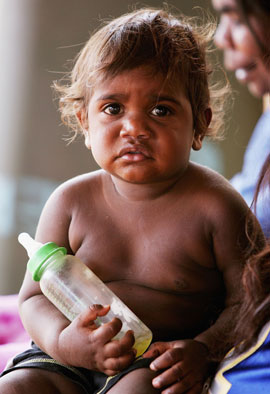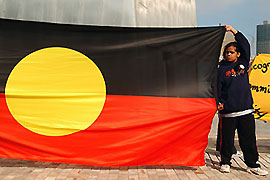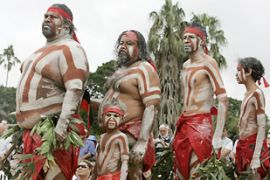Nationwide the life expectancy for Aborigines and Torres Strait islanders, who make up just over 2 per cent of the population, is at least 17 years below Australians in general.
The study comes as much of the rest of Australia is enjoying unprecedented prosperity on the back of an economic boom fuelled by China and India’s demand for the country’s natural resources.
|
|
Life expectancy
Australian males: 77 years
Aboriginal males: 59 years
Australian females: 82 years
Aboriginal females: 65 years
Source: Muru Marri indigenous health unit, University of New South Wales
|
“On many levels, indigenous health remains unacceptably low and at levels experienced nearly a century ago by our non-indigenous peers,” said Dr Lisa Jackson Pulver, of the University of News South Wales indigenous health unit, one of the authors of the study.
In April a similar survey, conducted by Oxfam and Aboriginal community health organisations, ranked Australia last in a table of wealthy countries over the health of their indigenous populations.
Al Jazeera’s correspondent Dan Nolan, who is in the central Australian town of Alice Springs, says the report confirms what has long been clear in towns such as Alice Springs: that Aboriginal people in Australia are among the most disadvantaged indigenous people in the developed world.
Guilt
 |
Aboriginal children face much shorter lives than
other Australians, the study said [GALLO/GETTY] |
John Howard, the Australian prime minister, has said the country should not have a “black armband” view of history, saying the country should look forward and not be weighed down by guilt over wrongs committed over the past 200 years.
But the authors of the WHO report disagree, saying much of the blame for the state of Aboriginal health can be traced back to the effects of colonisation and the forced removal of Aboriginal children from their families.
The report speaks of Aboriginal people being alienated from their country, their land, language and culture and suggests that despite what the government says, an acknowledgement of that is key to solving the problem.
Progress will not be made until the government publicly acknowledges the role of “stress, alienation, discrimination and lack of control” in creating poor health in the Aboriginal community, the authors wrote.
“To see the acknowledgement of past wrongs as symbolic fails to acknowledge the profound psychological impacts that these past and current wrongs have on Aboriginal peoples’ sense of identity and our capacity to actively participate in Australian society,” they said.
Preventable
 |
The report says Aboriginal alienation
is at the core of the problem [EPA] |
The report suggests that a small increase in health spending, just 1 per cent of the government’s healthcare budget, would bring the level of spending on Aboriginal health up to that of the rest of population.
According to the WHO, Aboriginal people are more likely to smoke, abuse substances, exercise infrequently and be obese, resulting in high rates of non-communicable diseases which are, to a great extent, preventable.
Commenting on the report, Tony Abbott, the Australian health minister, acknowledged the gap between the life expectancy of Aborigines and other Australians but said practical solutions rather that “gestures” were needed.
“It’s all very well to talk about formal apologies but I think indigenous people and the general population are much more interested in seeing better practical outcomes than in gestures, however meaningful those gestures might be to some,” he said.


